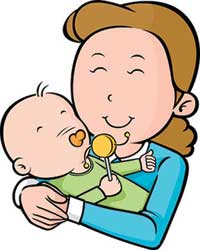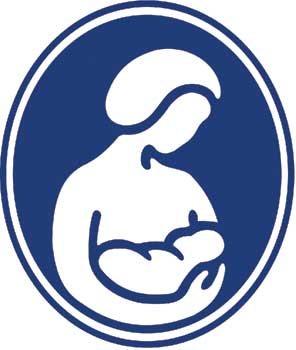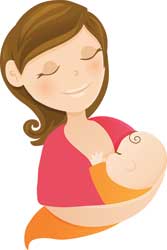Every year the first week of August is celebrated as the ‘Breast feeding week’ all around the world. You! takes a look...
Every year the first week of August is celebrated as the ‘Breast feeding week’ all
around the world. You! takes a look...
The practice of breastfeeding is common amongst most mothers throughout the world. However, many are yet to understand how important breastfeeding is for a child’s health and how it can affect the mother. World Health Organization (WHO) also actively promotes breastfeeding as the best source of nourishment for infants and young children. If every child was breastfed within an hour of birth, given only breast milk for their first six months of life, and continued breastfeeding up to the age of two years, about 800,000 children would be saved every year. 
This is why, every year the ‘World Breastfeeding Week’ is celebrated world over in order to spread awareness and knowledge about the practice and its advantages. Yes, breastfeeding is one of the most effective ways to ensure child health and survival. Read on to find out more...
What is it about?
World Breastfeeding Week is an annual celebration which is being held every year from 1 to 7 August in more than 120 countries. It was first celebrated in 1992 by World Alliance for Breastfeeding Action (WABA). WABA itself was formed on 14 February 1991 with the goal to re-establish a global breastfeeding culture and provide support for breastfeeding everywhere. The World Health Organization (WHO) and the American Academy of Paediatrics (AAP) emphasize the value of breastfeeding for mothers as well as children. Both recommend exclusive breastfeeding for the first six months of life and then supplemented breastfeeding for at least one year and up to two years or more. According to the WBW website, 540 events have been held worldwide by more than 79 countries with 488 organizations and 406,620 participants for the World Breastfeeding Week 2010. This year, the World Breastfeeding Week theme is about how breastfeeding is a key element in getting us to think about how to value our wellbeing from the start of life. The objectives of the initiative this time round is to anchor breastfeeding as a key component of sustainable development and further promote it while emphasizing on the benefits even in today’s day and age of technology.
How it helps the baby...
Breast milk is best for your baby, and the benefits of breastfeeding extend well beyond basic nutrition. Most importantly, all worried mothers need to know that according to a study by the National Institute of Environmental Health Sciences showed that children who are breastfed have a 20 percent lower risk of dying between the ages of 28 days and 1 year than children who weren’t breastfed, with longer breastfeeding associated with lower risk. In addition to containing all the vitamins and nutrients your baby needs, breast milk is packed with disease-fighting substances that protect your baby from illness.
Thinking of skipping breastfeeding is a bad idea as breast milk contains antibodies that help your baby fight off viruses and bacteria. Plus, babies who are breastfed exclusively for the first 6 months, without any formula, have fewer ear infections, respiratory illnesses, and bouts of diarrhea. Hence, your baby will be ill less often, so that means fewer sick days for you. Breastfeeding may also help children avoid a host of diseases that strike later in life, such as type 1 and type 2 diabetes, high cholesterol, and inflammatory bowel disease.
According to research, breastfed babies have a better antibody response to vaccines than formula-fed babies. Various researchers have also found a connection between breastfeeding and cognitive development. In a study of more than 17,000 infants followed from birth to 6 1/2 years, researchers concluded from IQ scores and other intelligence tests that prolonged and exclusive breastfeeding significantly improves cognitive development.
Another study of almost 4,000 children showed that babies who were breastfed had significantly higher scores on a vocabulary test at 5 years of age than children who were not breastfed. Breastfeeding may also protect your child from obesity. Yes, that is right, the American Academy of Pediatrics recommends breastfeeding as a way to help reduce your child’s risk of becoming overweight or obese. An analysis of 17 studies published in the American Journal of Epidemiology shows that breastfeeding reduces a child’s risk of becoming overweight as a teen or adult. Breastfed babies have more leptin in their system, a hormone that researchers believe plays a role in regulating appetite and fat. Compared with breastfed babies, formula-fed infants gain weight more rapidly in the first weeks of life which can later lead to obesity.
What it can do for you Stronger bones:
Women who breastfeed have a lower risk of postmenopausal osteoporosis. When a woman is pregnant and lactating, her body absorbs calcium much more efficiently, so while some bones, particularly those in the spine and hips, may be a bit less dense at weaning, six months later, they are more dense than before pregnancy.
A calorie incinerator: You may have heard that nursing burns up to 500 calories a day. And that is almost right. Breast milk contains 20 calories per ounce. If you feed your baby 20 ounces a day, that’s 400 calories you have swept out of your body."
Better healing post-delivery: The oxytocin released when your baby nurses helps your uterus contract, reducing post-delivery blood loss. Plus, breastfeeding will help your uterus return to its normal size more quickly - at about six weeks postpartum, compared with 10 weeks if you don’t breastfeed.
Reduces risk of cancer: You will be at a lower risk of premenopausal breast cancer and ovarian cancer, an often deadly disease that is on the rise.
A menstruation vacation: Breastfeeding your baby will delay ovulation, which means delayed menstruation. Breastfeeding causes the release of prolactin, which keeps oestrogen and progesterone at bay so ovulation isn’t triggered. Many moms who solely nurse will see their periods return between six and eight months after delivery.
Reduces stress level and risk of postpartum depression: The National Institutes of Health reviewed more than 9,000 study abstracts and concluded that women who didn’t breastfeed or who stopped breastfeeding early on had a higher risk of postpartum depression. Many women report feeling relaxed while breastfeeding. That is because nursing triggers the release of the hormone oxytocin and the chemical promotes nurturing and relaxation. One study found that women who had high amounts of oxytocin in their system (50 per cent of breastfeeding moms as opposed to 8 per cent of bottle-feeding moms) had lower blood pressure after being asked to talk about a stressful personal problem.
Common challenges of breastfeeding
Sore nipples. You can expect some soreness in the first weeks of breastfeeding. Make sure your baby latches on correctly, and use one finger to break the suction of your baby’s mouth after each feeding. That will help prevent sore nipples. If you still get sore, be sure you nurse with each breast fully enough to empty the milk ducts. If you don’t, your breasts can become engorged, swollen, and painful. Holding ice or a bag of frozen peas against sore nipples can temporarily ease discomfort. Keeping your nipples dry and letting them "air dry" between feedings helps, too. Your baby tends to suck more actively at the start. So begin feedings with the less-sore nipple.
Dry, cracked nipples. Avoid soaps, perfumed creams, or lotions with alcohol in them, which can make nipples even more dry and cracked. You can gently apply pure lanolin to your nipples after a feeding, but be sure you gently wash the lanolin off before breastfeeding again. Changing your bra pads often will help your nipples stay dry. And you should use only cotton bra pads.
Worries about producing enough milk. A general rule of thumb is that a baby who’s wetting six to eight diapers a day is most likely getting enough milk. Avoid supplementing your breast milk with formula, and never give your infant plain water. Your body needs the frequent, regular demand of your baby’s nursing to keep producing milk. Some women mistakenly think they can’t breastfeed if they have small breasts. But small-breasted women can make milk just as well as large-breasted women. Good nutrition, plenty of rest, and staying well hydrated all help, too.
Pumping and storing milk. You can get breast milk by hand or pump it with a breast pump. It may take a few days or weeks for your baby to get used to breast milk in a bottle. So begin practicing early if you’re going back to work. Breast milk can be safely used within 2 days if it is stored in a refrigerator. You can freeze breast milk for up to 6 months. Don’t warm up or thaw frozen breast milk in a microwave. That will destroy some of its immune-boosting qualities. Thaw in the refrigerator or in a bowl of warm water.
Breast infection (mastitis). This occasionally results when bacteria enter the breasts, often through a cracked nipple after breastfeeding. If you have a sore area on your breast along with flu-like symptoms, fever, and fatigue, call your doctor. Antibiotics are usually needed to clear up a breast infection, but you can most likely continue to breastfeed while you have the infection and take antibiotics. To relieve breast tenderness, apply moist heat to the sore area four times a day for 15 to 20 minutes each time.
Stress. Being overly anxious or stressed can interfere with your let-down reflex, which is your body’s natural release of milk into the milk ducts. It can also be triggered just by hearing your baby cry or thinking about your baby. Stay as relaxed and calm as possible before and during nursing - it can help your milk let down and flow more easily. That, in turn, can help calm and relax your infant.